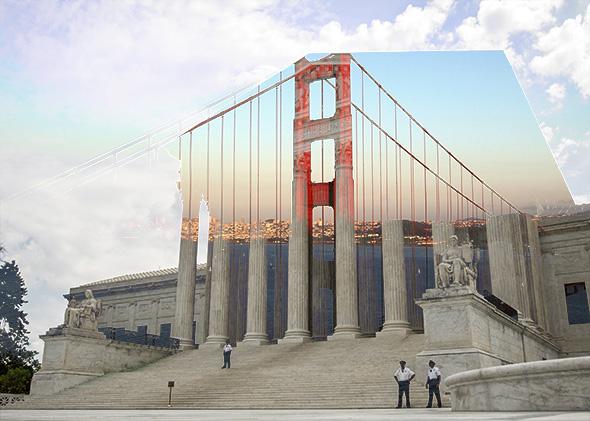San Francisco v. Sheehan had all the makings of a blockbuster Supreme Court case. It emerged from a horrifying tragedy: Two police officers repeatedly shot a mentally ill woman in her own home after she threatened them with a bread knife. It centered around a contentious question: whether police officers must take mental disability into account before using deadly force. It pointed toward a disturbing outcome: During oral arguments the court appeared poised to let cops kill belligerent disabled people so long as the cops could rustle up some plausible pretext.
But on Monday the Sheehan saga ended anticlimactically. Rather than handing police officers an expanded right to shoot disabled people, the court swatted away the case. Although the justices granted qualified immunity to Sheehan’s shooters, they grudgingly dismissed the question of whether the Americans With Disabilities Act, or ADA, requires cops to “accommodate” mentally disabled people during police encounters. San Francisco, the court noted, dropped this question after the justices agreed to hear its case. And if San Francisco wouldn’t ask the question, the Supreme Court had no business answering it.
This resolution may be bathetic—but it’s also a pretty big victory for disability rights advocates and for police accountability. The ADA instructs local governments to give “reasonable accommodations” to disabled people. Several federal appeals courts have found that police officers—who are, of course, government employees—aren’t exempt from this requirement, and must take care not to treat mentally ill people like violent offenders. (In Sheehan’s case, the officers might have recognized her threats as deranged rambling and resisted the urge to draw their guns.) Had the Supreme Court considered this question, it might well have ruled that the ADA did not apply to police confronting mentally ill people, and thus overturned previous rulings. San Francisco, by simply accepting the proposition that police should accommodate the mentally ill, removed it from the conservative justices’ crosshairs, leaving the ADA safe for another day.
Why, though, would San Francisco, defending its own police officers, abandon what was almost certain to be a winning argument? In a magnificently ferocious benchslap, Justice Antonin Scalia (joined by Justice Elena Kagan) accused San Francisco of playing the court for a fool. The city, Scalia alleged, used “bait-and-switch tactics” to trick the court into taking the case, pretending as though it sought resolution to the ADA question. Then, once the court was “induce[d]” to review the case, San Francisco yanked away the ADA dispute, leaving the justices with a measly rump of a case. Scalia and Kagan suggested the court should have simply dismissed the entire case, in part to punish the city for its duplicity.
As ThinkProgress’s Ian Millhiser pointed out, this is a strangely naïve accusation from the (usually worldly) Scalia and Kagan. As soon as San Francisco appealed this case to the Supreme Court, civil rights groups implored Mayor Ed Lee and City Attorney Dennis Herrera to give it up. So long as police officers fear the ADA may require them to accommodate mentally ill people, they have a strong incentive to create special protocols for seemingly violent suspects acting under the influence of a disability. If the court gutted that portion of the ADA, officers would have little motivation to treat mentally ill people with extra care and caution. Already, nearly half of police shooting victims are mentally ill. With a bad court ruling, that number could shoot up even higher.
We can’t know for sure whether San Francisco’s city attorney modified his appeal following pleas from the civil rights community or intervention by the mayor. But the city really had no other reason to give up its tactical advantage so suddenly. And, presuming it did drop its claim in the interest of justice, San Francisco certainly wouldn’t be alone. Over the past several years, for instance, fair-housing advocates have twice convinced litigants to settle rather than push their claims to the Supreme Court. (The court finally got ahold of the fair-housing issue this term, and eager conservative justices licked their chops during arguments.) In 2012 the disability rights community also convinced Washington Gov. Christine Gregoire to abandon a case that would give the Supreme Court the opportunity to overrule a vital ADA decision from 1999. The 1999 case was decided with Justice Sandra Day O’Connor in the majority. Now O’Connor is gone, replaced by Justice Samuel Alito. And no progressive wants Alito anywhere near a civil rights case.
Liberals involved in public impact litigation could learn a lesson from San Francisco. As Millhiser wrote in Slate last year, the current Supreme Court is an overwhelmingly conservative place: If you’re a liberal and you’re fighting for anything other than gay marriage, you’re probably going to lose at the high court. Somehow, that glaringly obvious fact hasn’t stopped progressives from bringing their favorite causes to get slaughtered by the conservative justices. Just last term, liberals gave the court an opportunity to cut back on both affirmative action and separation of church and state. The court happily obliged. The plaintiffs in both cases lost in lower courts. They could have accepted their losses as a necessary sacrifice. Instead, they appealed right up to the Supreme Court, and got rulings that cut back on everybody’s rights, not just their own.
Anybody who cares about disability rights, then, should be grateful for San Francisco’s dodge. It may have been inglorious and, legally speaking, a little unseemly. But it reflected a pragmatism that has been conspicuously absent from recent progressive litigation. San Francisco’s city attorney won’t win many laurels for his last-minute evasion. But his maneuvering saved the rest of the country from a ruling that may have given cops free rein to treat mentally disabled people like typical violent offenders—and pull the trigger accordingly.
